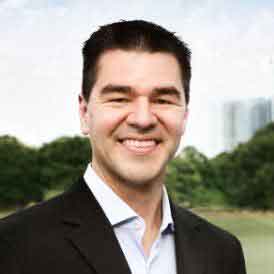
That raises the question of how teenagers who plan on careers in business, finance, technology and media should prepare for their own futures in the workplace, when they'll never get the pre-2020 experience when most people came into the office most of the time. And while a tight job market might make it easier than ever to land a job without going to college, for industries where who you know and the strength of your network is a key asset, we're going to find that going to college has even more value than it did before the pandemic.
That's the takeaway from new research published in Nature showing where people in different income brackets make friends. Lower-income people tend to make most of their friends in their neighborhoods, while those who are upper-income tend to make most of their friends in college.
Future doctors and lawyers don't need to be convinced about the merits of going to college — they do several years of graduate school on top of undergrad, But for other high-paying professions there's the hope that by skipping college and going straight into the workplace, one can move up the ranks over time via networking in the office and demonstrating one's ability to bosses and managers.
That path was already difficult but has become even more uncertain as white-collar industries adjust to a new normal of hybrid and remote work. Maybe 20-somethings will be eager to show up at offices every day to network and gain skills, but if older and higher-up employees work from home some or most of the time those younger people won't have access to the same amount of relationship-building that workers who came of age before 2020 got.
If building a network and making friends at work are going to become more difficult in the future, then it raises the relative value of places that have demonstrated an effectiveness at doing just that — such as college.
It also suggests that some students should think differently about their priorities when choosing a college. I went to Harvey Mudd College in Claremont, California. I was attracted to its reputation in engineering and computer science, the small campus and student body (my graduating class was around 150), and an academic reputation that was on par with MIT and Caltech.
What I didn't think much about at the time was how the flip side of a small student body is it means a very small alumni network. And whereas MIT and Caltech are well-known nationally, Harvey Mudd isn't well known outside of technology fields or beyond California. As my career migrated from California and the tech industry to, over time, Atlanta and the financial and media industries, I haven't been able to leverage my time at Mudd the way I might have at a different school with a bigger student body and alumni network.
This isn't to say that people shouldn't go to smaller colleges. It's just that network maximization relative to skill development has more value now than it did three years ago.
And, as someone who went to public schools through high school, I cringe when I write this, but it also argues that, if they can afford it, people should give more consideration to private school than they otherwise might have. The same rationale applies here as well: If it's going to be harder to build a network from scratch in the workplace, then forming bonds with elite students and families in high school is a way of ensuring you'll have the network even if the future of work is hopping from remote job to remote job via employment sites like LinkedIn and Indeed.
As an optimist, I'm hopeful that we'll work out the kinks in remote work over time, and that people will still be able to build networks and make friends at work. But I also think back on my own career and doubt that I'd have some of the connections I do if the workplace were significantly remote or even hybrid when I was in my 20's. So it makes sense for young people thinking about their futures to invest more time in their networks in high school and college, because it's just not clear what the workplace will look like when they're building careers of their own.
(COMMENT, BELOW)
Previously:
• 06/17/22 Housing market cooldown will only lead to more dysfunction
• 05/27/22 Welcome to our be-careful-what-you-wish-for economy
• 05/04/22 The Amazon economic indicator says inflation is easing
• 01/20/22 Don't call me on Friday. That's my 'me time'
• 01/06/22 2022 is the year to buy your first luxury electric car
• 06/03/21 The post-pandemic boom will have a sequel in 2022
• 05/31/21 Florida may lose some of its boomer shine
• 01/11/21 Colleges bet on football in their own K-shaped recovery
• 12/31/20 Just send the bigger bucks already
• 08/24/20 Young people can't buy homes until older owners . . . move on
• 08/18/20 Our pandemic love affair with e-commerce could soon sour
• 08/10/20 Booming 'zoom towns' should ease city housing costs
• 07/11/20 With a Biden economy, will America be condemned to relive the '70s?
• 07/14/20 Renting and homebuying swap roles in the covid-19 market
• 07/13/20 Markets may have a reason to rise along with covid-19 cases
• 04/27/20 U.S. economy may have hit the coronavirus bottom
• 11/12/19 The 2020 economy should feel a lot better: What to, realistically, expect
• 04/23/19: Gen Z is likely to temper aging socialist millennials
• 03/25/19: All signs point to a housing boom ahead
• 02/19/19: Trump's economic gamble might make sense
• 02/15/19: Scaring off Amazon will backfire for the Left
• 01/29/19: The 2020 election will shred the Obama coalition
• 11/15/18: Amazon proving the 'rich get richer'?
• 11/13/18: How gerrymandering can reduce the partisan divide
• 10/22/18: The politics of the next recession will be a disaster
• 08/02/18: The future of the US looks a lot like ...
• 05/05/18: Brick-and-mortar stores may start to make sense again
• 05/05/18: College admissions season is about to get much easier
• 05/03/18: Changing housing needs of millennials will change economic development
• 02/13/18: The big idea for Middle America is to think small
• 02/07/18: Dems are caught in a tax bill trap this year
• 10/25/17: Good times have come to Trump-leaning states
Sen is a portfolio manager for New River Investments in Atlanta and has been a contributor to the Atlantic and Business Insider.


 Contact The Editor
Contact The Editor
 Articles By This Author
Articles By This Author